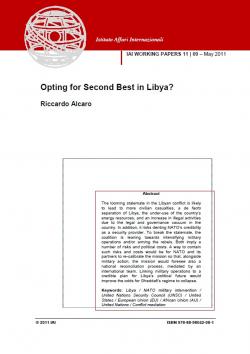Opting for Second Best in Libya?
The looming stalemate in the Libyan conflict is likely to lead to more civilian casualties, a de facto separation of Libya, the under-use of the country’s energy resources, and an increase in illegal activities due to the legal and governance vacuum in the country. In addition, it risks denting NATO’s credibility as a security provider. To break the stalemate, the coalition is leaning towards intensifying military operations and/or arming the rebels. Both imply a number of risks and political costs. A way to contain such risks and costs would be for NATO and its partners to re-calibrate the mission so that, alongside military action, the mission would foresee also a national reconciliation process, mediated by an international team. Linking military operations to a credible plan for Libya’s political future would improve the odds for Gheddafi’s regime to collapse.
-
Details
Roma, Istituto Affari Internazionali, May 2011, 11 p. -
Issue
11|09 -
ISBN/ISSN/DOI:
978-88-98042-08-1
Introduction
1. Mission creep
2. The looming stalemate
3. More air raids?
4. Boots on the ground?
5. Arming the rebels?
6. Opting for second best: National reconciliation … without Gheddafi?
7. An inclusive political strategy for Libya's future
Conclusion



